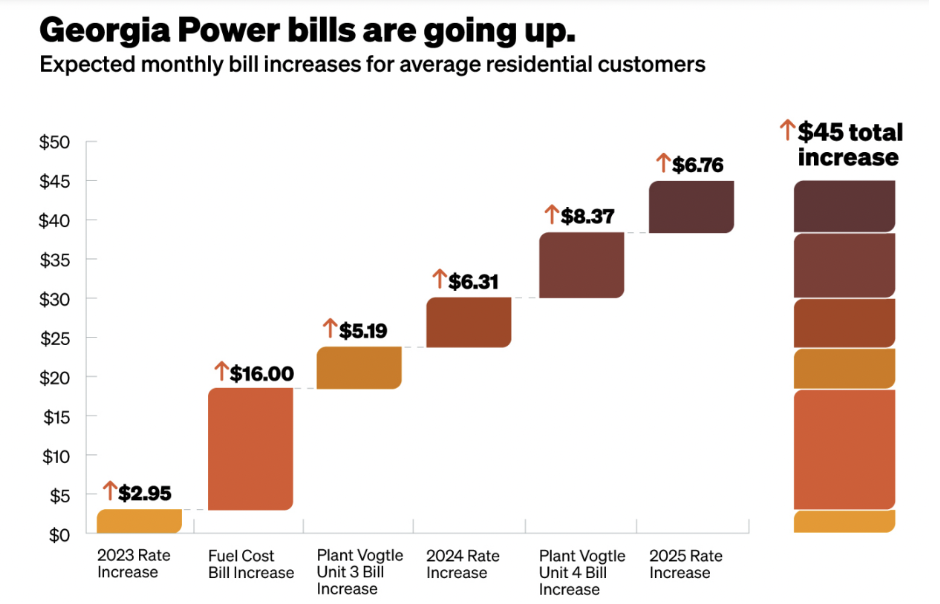On Tuesday, May 2, the Georgia Public Service Commissioners will hold hearings on Georgia Power’s fuel cost reimbursement proposal to recoup billions of dollars in unbudgeted costs from volatile fossil gas prices over the past two years, along with projected future costs for fuel sources in next two years. Georgia Power officials estimate that their unrecovered fuel expenses over the last two years could reach $2.6 billion. This cost is passed on to customers, resulting in an additional $16 per month on customers’ power bills.
This proposed bill increase is separate from the three rate increases Georgia Power received approval for in 2022, one of which already raised bills at the beginning of 2023 with rates set to increase twice again in 2024 and 2025. There will also be a separate increase when Vogtle Unit 3 comes online later this year, and yet another when Unit 4 comes online next year.
Jeremy Kalin, a witness testifying for SACE and Sierra Club, described the current system for assigning fuel cost as a “moral hazard” for ratepayers in pre-filed testimony before next week’s hearing, “[A] moral hazard exists when the consequences of a decision are so disconnected from the decisionmaker that that party takes a bigger risk as a result.”
Bryan Jacob, Solar Program Director of Southern Alliance for Clean Energy, said, “Georgia Power makes resource decisions, but ratepayers bear the risk if the utility’s fuel cost projections are wrong. Adding insult to injury, Georgians already face the 8th highest electricity bills in the country. Georgia Power misjudged fuel prices by more than $2 billion over the last three years. In addition to those five increases referenced above, Georgia Power petitioned the Georgia Public Service Commission (PSC) to tack on another $23/month ($276/year) to typical residential customers’ bills. Georgia Power has subsequently negotiated a settlement with PSC Staff to reduce this increase to $16/month, which both parties are representing as “saving” ratepayers money.”

This fuel cost increase could have been more; it should have been less
The $23/month increase (now $16/month) could have been $30/month. The deficit was so large that Georgia Power proposed to collect the shortfall over three years instead of the conventional two years. But that misses the point, too. Many intervenors in the triennial resource planning proceedings have argued for more zero-fuel resources like solar in Georgia Power’s resource portfolio.
Brent Alderfer, also a witness for SACE and Sierra Club, said in his pre-filed testimony, “Under the same assumptions, adding solar generation equal 10% of total load would save about $1 billion in fuel costs over three years and additionally thereafter.”
The pre-filed testimony goes on to say that the Commission should include some amount of fuel-cost-sharing and fuel-risk-sharing by the utility, to mitigate the moral hazard under the current policy of passing through 100% of fuel costs to ratepayers, and at the very least open a “Fuel Cost Recovery modernization docket” to address this issue for the future. Sharing even 10% of fuel risk and fuel costs with the utility can have a dramatic benefit for reliability, resource diversity, ratepayer protection, and utility performance.
Further illustrating the point, a new whitepaper released by SACE, “Decoding Fuel Costs in Electric Bills,” analyzes fuel costs in the three investor-owned utilities in Florida, yet is applicable to Georgia Power. The whitepaper decodes the impact of high gas prices on electric bills and lays out what utilities can and should be doing to mitigate this burden on customers:
- Reduce utilities’ heavy reliance on gas
- Invest in energy efficiency, renewables, and energy storage
- Modernize fuel cost regulations so that utilities bear some risk of volatile fuel price
The Georgia Public Service Commissioners are scheduled to make a final decision in Georgia Power’s fuel cost case on May 16.
###
About the Southern Alliance for Clean Energy
Since 1985, the Southern Alliance for Clean Energy has worked to promote responsible and equitable energy choices to ensure clean, safe, and healthy communities throughout the Southeast. Learn more at www.cleanenergy.org.









